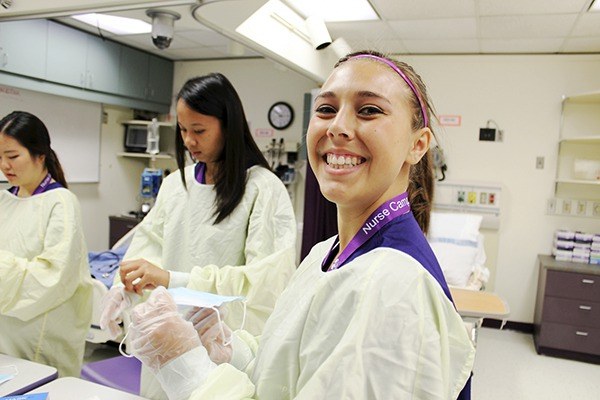After seven years in and out of the hospital, Sequim student Tia Bourm, 17, now knows her experiences can help others.
As one of 24 students selected out of 126 applicants, Bourm went to the University of Washington’s Nurse Camp July 21-25 where she saw an introduction into the world of nursing. She studied CPR, received nursing school admissions and financial aid advice, and gathered lifelong memories.
“I’ve been in the hospital all the time and saw what the nurses do and wanted to be a part of it,” she said. “I want to explore the different types of nursing that are out there.”
Being in a hospital isn’t a rarity for Bourm who was diagnosed in Nov. 6, 2006, with achalasia, a disease that prohibits the muscle of the esophagus from contracting to open and let food pass into the stomach.
At the camp, Bourm found her experiences in the hospital came full circle.
While shadowing a nurse, she met a woman in her 50s waiting for a transplant. The patient had to wait several hours for surgery so she couldn’t eat or drink anything and wasn’t hooked up to an IV for fluids.
“When I walked in, she said, ‘I know my nurse isn’t going to get me a 7-Up. Can you get me a 7-Up?’” Bourm said. “I told her I can’t do that, sorry.”
Instead the teen turned to her personal experience to relate to the patient and share what works for her.
“With all the tests I get, I’m not supposed to eat until I get my tests or surgery, so I could really relate,” Bourm said. “I know how you feel. I’ve been in and out of the hospital and I can’t eat. Try to get your mind off it. Do things like crossword puzzles. Read a book. Do things that are going to pass time so it’ll go faster.”
The woman was grateful, Bourm said, and finished crosswords and wrote in her journal the rest of the day.
“Since I’m so young and for someone, who is waiting for a transplant to save their life, to take advice from me was really cool,” she said.
Rarity, perseverance
Achalasia is rare, particularly in children and only a handful of doctors were studying it in the nation at Bourm’s diagnosis.
In 2006, Bourm and her family waited for a diagnosis after months of trials and tribulations including having her tonsils and adenoids removed.
Her mom Cathy Bourm said there isn’t a cure but only temporary fixes.
Tia has gone to the chiropractor, taken several types of medications and received acupuncture that didn’t really treat it, she said.
Last fall, the achalasia worsened for Tia as she couldn’t eat and began losing weight.
“I was told my esophagus looks like a 60 year old’s,” Tia said. “Now it curves like a river and it’s like a second stomach at the bottom of the esophagus.”
Cathy said it is where a lot of the pain comes from.
Doctors have discussed surgery such as replacing the esophagus, but told the family it isn’t an option until Tia is much older.
For now, Tia’s best defense is a controlled diet. She has a health plan at school and eats small meals in half portions. While achalasia may set her back, she doesn’t become discouraged.
Tia remains active in school splitting her time this year at Sequim High School and Peninsula College’s Running Start program, playing for the Sequim High School varsity fastpitch team, working with children at the Clallam County YMCA and volunteering once a week at Olympic Medical Center as a floor runner helping with nurse’s errands.
Last year, she spoke on her perseverance for the Trey Green Guild and was supposed to speak at the Sequim Hospital Guild’s fundraiser but was in the hospital at the time.
On July 24, Tia’s eyes widened to her options in the nursing field at the nurse camp after hearing different nurses working in many fields — from a county jail to a flight nurse —speak about their jobs.
Tia said she’s wanted to work with children as a nurse but didn’t know she had so many options.
She’s considering becoming a Pediatric Intensive Care Unit, PICU, nurse.
From her experience, the concept she’s learned most of all is that nurses are advocates for the patients.
“They’re not just there to help them (patients) feel better or take their vitals,” Bourm said. “They are really telling the doctor this medication will help them. They are in between the doctor and the patient really making sure the patient is getting the best care that they can.”
Seahawks salutations
During the Seattle Sea-hawks Super Bowl run, the Bourm family learned linebacker Malcolm Smith, who went on to become the Super Bowl MVP in February, has achalasia, too.
Tia was told by school counselor Nate Hirsch about Smith and she and her family wrote letters to Smith saying how big of fans they are of him and the team.
“(Achalasia) is so rare, we don’t know anyone close by who has it,” Cathy said.
After the Super Bowl, Cathy said they sent him another letter of congratulations on the Super Bowl win. One day, Tia received a text from Smith saying not to let anything stop her and to always reach for her goals.
It’s saved on her phone to this day.
Reach Matthew Nash at mnash@sequimgazette.com.



